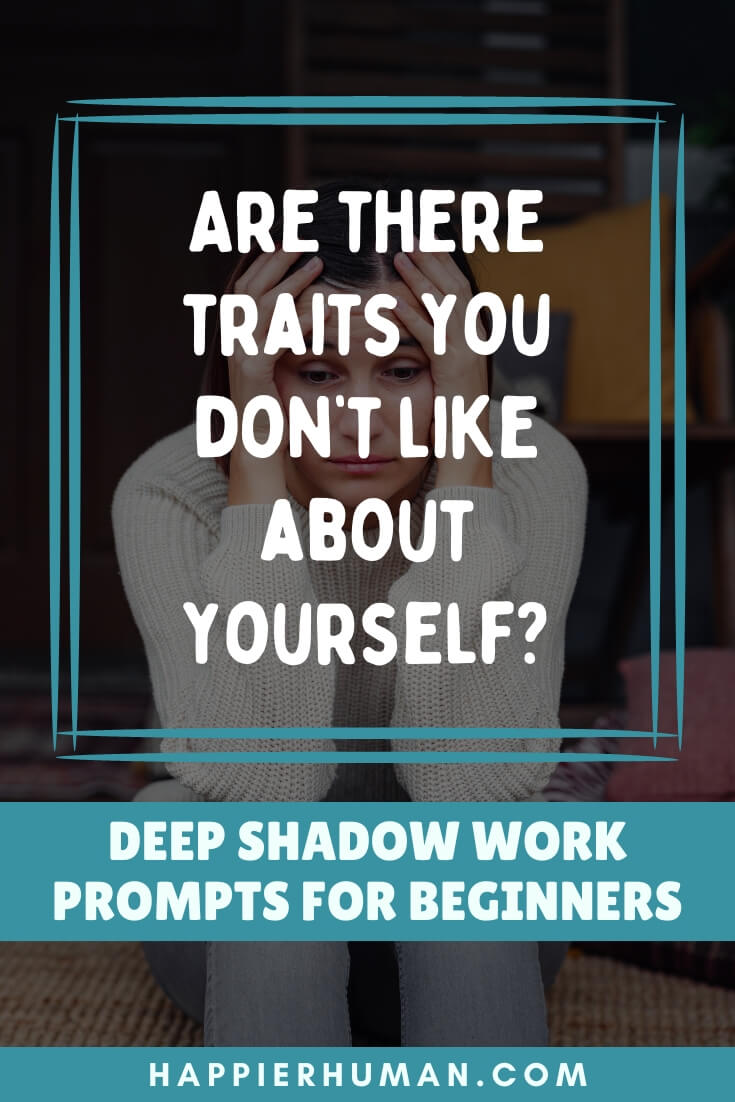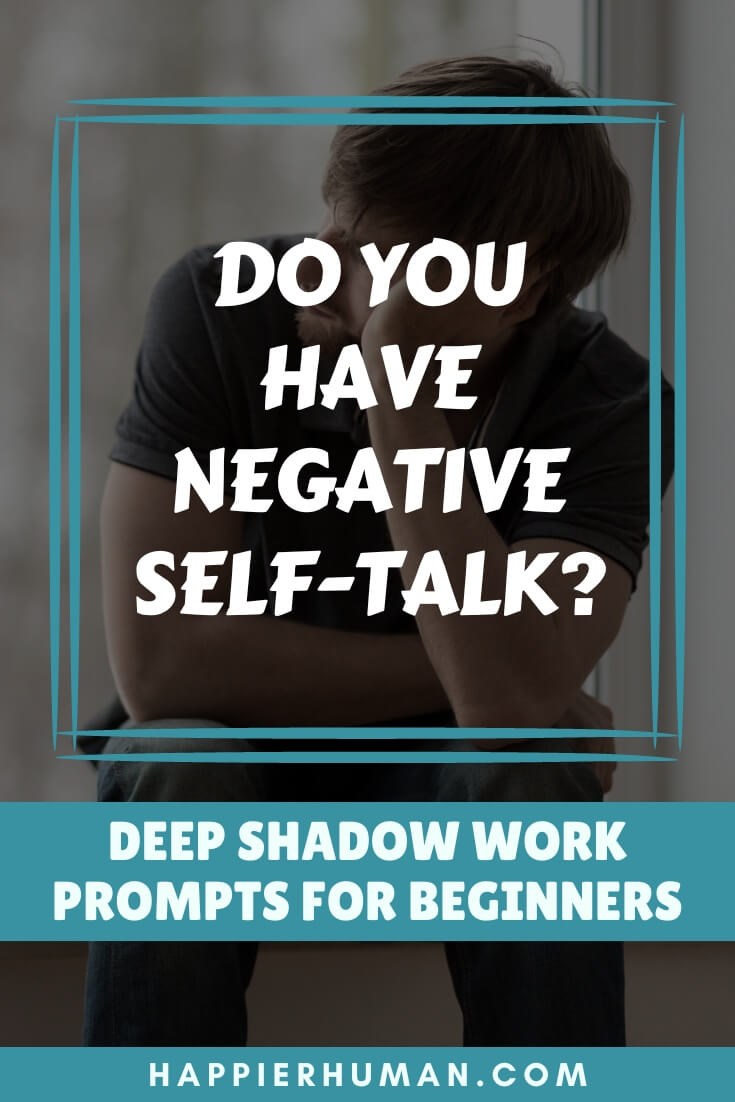Sometimes, while walking my dog in our neighborhood, I catch a glimpse of something in my peripheral vision that startles me. I stop and look around, seeing only my shadow on the ground. I scoff at the metaphors in my mind.
After I learned about shadow work prompts and my “shadow self,” I began to wonder if what actually startles me on our walks are the darkest secrets I’ve buried deep within my psyche.
What is Shadow Work?
Shadow work is a form of psychotherapy involving the unmasking and healing of a person’s “shadow self,” repressed or hidden deep in the human psyche.
Shadow work is a process that requires slow and careful steps and may take a long time to achieve, depending upon the person and the severity and depth of their shadows.
Thoughts, memories, or emotions are repressed for various reasons. Negative emotions are uncomfortable and often re-traumatize an individual. Attempting to push them out of our lives is a natural coping mechanism or defense mechanism to avoid having to experience suffering all over again.
Other reasons why people repress emotions, thoughts, or memories include:
Shadow work may or may not necessitate the help of a professional counselor or psychotherapist. Each individual must decide what is best for their shadow work.
Let’s take a look at why shadow work therapy is something we should consider doing.
Why Someone Should Engage in Shadow Work
In 1945, psychiatrist Carl Jung published his theory on the shadow, which he referred to as “the thing a person has no wish to be.” The shadow itself is a part of the ego having to do with emotions, personality, and identity. It is the culmination of the darkest pieces of ourselves that we wish we were not.
Jung believed that the more a person dismisses the shadow from consciousness, the more repressed, darker, and denser it becomes. Although we try to erase it from who we are, it remains.
The “shadow self” always stays with the person, connecting directly or indirectly to everything in life, from choosing what color shirt to wear to forming an opinion about something. It shapes our behaviors, affects our moods, and motivates us to get up each morning.
Every person has a “shadow self.” It’s part of being human. Confronting that part of ourselves to improve who we are is quite literally shadow work. It’s typically conducted through journaling or counseling and involves shadow work prompts to access repressed parts of the psyche.
From there, care and healing can aid in improving the overall person.
There are many reasons why someone should engage in shadow work. These are a few:
You now know what shadow work is and why you should do it. It’s time to talk about the outstanding benefits it can have in your life.
The Benefits of Shadow Work
Shadow work is a process. The time and manner in which you choose to approach it are as variable as every person is unique. The important thing is that you don’t rush the process. You’ll need a lot of TLC and self-care to do this right, but it is definitely worth it for the benefits it provides.
Jung and other experts believe that shadow work continues over a lifetime because we never stop growing and learning. The idea is that there is no end game or perfect place of enlightenment.
Our experiences and thoughts are constantly moving, shifting, and changing. So, don’t expect that you will achieve a crowning victory, but you can win the prize of improving yourself along the journey.
The benefits of shadow work are there, and they are real. But instead of winning a shiny new trophy, you win a more complete version of yourself. With the realness, uniqueness, and talents of your shadow integrated into your outward life, you will feel whole, happy, and free.

Imagine people loving you for just being you. That’s what happens when you build up your self-awareness and strengthen the positive way you interact with others. It will help heal your relationships and create solid new ones.
With shadow work, you’re not merely learning to cope with those hidden aspects of yourself or the traumas or situations that caused them. You are exposing, healing, and recreating those aspects to merge with the rest of you. And because it is an ongoing process, you’re always becoming a better human being.
As for benefits, you’ll discover that shadow work gives you the opportunities to:
What are Shadow Work Prompts?
Shadow work prompts are thoughts or questions posed to help you connect with the repressed thoughts, emotions, beliefs, and perceptions that make up the essence of your shadow.
Their purpose is to promote healthy and transformative growth and healing by acknowledging and addressing the profoundly hidden truths in your mind.
The prompts are designed to pinpoint a specific hidden personality trait, feeling, emotion, belief, thought, or perception to bring to the surface. Then, you can reflect on understanding its existence, whether or not it possesses any good or potential, and how to manage it.
These are things to reflect on about each shadow aspect:
Then, think about these questions:
By integrating and incorporating the beneficial aspects of our “shadow selves” and healing the negative, our lives are enhanced in the numerous benefits listed above. All it takes is courage and a first step forward.
As with any type of self-reflective work, there are other techniques that work well alongside prompts. Some will significantly enhance your insight and benefits from doing the work.
Here are a few self-reflective techniques to contemplate adding to your shadow work:
This list of shadow work prompts will help you begin the process of mentally and spiritually unraveling the things about yourself that you’ve tucked away because you wish they weren’t a part of you.
Whether it’s a shameful thought or embarrassing behavior, using shadow work cues will guide you in adopting a new perspective of yourself.
111 Deep Shadow Work Prompts for Beginners in 2024
We have an ever-changing gamut of societal norms, challenges, expectations, fluctuating economics, and quantum leaps in advanced technologies. That’s why a new template of shadow prompts is needed. Our selection of deep shadow work prompts speaks to the most common questions and those relevant in today’s world.
As a beginner, the best way to get the most out of shadow work questions is to keep a daily journal. Some of the world’s greatest minds, including authors, scientists, artists, speakers, social justice activists, and others, have relied on journaling to organize their thoughts.
Journaling reduces anxiety and provides clarity of mind. It helps you to map out your goals, track your progress, and review your hard work. It builds self-confidence, strengthens your memory, and inspires you. Journaling is not restrictive; you can even journal your shadow work questions and responses.
As another option for a beginner to shadow work, you may want to review the prompts with a professional counselor, therapist, or psychiatrist. This can be especially helpful if the repressed thoughts or memories are so deep because they were incredibly traumatizing, and you simply cannot remember them.
Another advantage to counseling and therapy is that sometimes you just really need an excellent listening ear who will keep your thoughts and confessions confidential. You may also choose a trusted friend, religious leader, or anyone else who will not divulge your deepest secrets until you are ready.
When you can’t remember those entrenched thoughts or memories, it does not mean that they are harmless. As Jung explained, even subconsciously or seemingly forgotten, they are inherently still connected to everything you think or do. They are part of you and influence you through and through. It is all interconnected.
One of the most curious features of repressed emotions, feelings, and thoughts is that valuable and positive skills, talents, and other aspects are inadvertently pushed down with the negative things we wished to hide. Who wouldn’t love to have those back? You can get them back, but you and you alone have to take the first step.
Let’s get started by reviewing the basic shadow work questions.
Shadow Work Prompts Regarding Childhood Development
- How do you picture yourself as a child?
- What kind of values were you taught as a child?
- Did you get along well with teachers and classmates as a child?
- In childhood, what was your biggest fear?

- What memory do you have as a child that makes you feel shame?
- What was the worst thing you ever did as a child?
- How did you feel about your siblings?
- What would you change about your childhood?
- Did you spend a lot of time alone in your childhood?
- Who was your childhood hero?
- What is your most vivid childhood memory?
- What is the one demand you heard over and over as a child?
- Did you feel accepted and understood as a child?
- As a child, were you ever told how to react or feel?
- Do you believe your parents or guardians influenced any of your personality traits?
- Were your parents or guardians demanding of you?
- Did you have good role models as a child?
- Did you have a dysfunctional family?
- As a child, did you ever feel like an outcast?
Shadow Work Questions about Self-Perception
- What would be your first impression of meeting your “shadow self” face-to-face?
- If your “shadow self” was a separate person, what would they look and act like?
- How does your family describe you?
- What type of people do you hang around with?
- What are your negative personality traits?
- Can you think of ways to improve those negative personality traits?
- What are your core values as an adult?
- Are there traits you don’t like about yourself?

- Why do you believe you have those traits?
- What makes you feel you’re not as good as other people?
- What would the title be if you wrote a book about your life?
- What parts of yourself do you think need improvement?
- Are you patient with yourself?
- Do you avoid talking about your past in conversations?
- What is the worst thing you’ve ever done to another person?
- What is the worst thing you’ve ever done to an animal?
- Does your feeling of self-worth come from a healthy place?
- Do you mask your identity and personality in public?
- Do you ever lie to yourself?
- Do you feel a need to lie to others?
- Do you ever self-sabotage?
- What would you like to change about yourself?
- How influenced or pressured are you by others’ opinions or beliefs?
- What kind of value do you attach to your experiences?
- What is your biggest regret?
- Do you do things just to please others?
- Do you believe in your potential?
- Do you have negative self-talk?

- Are you afraid of being a failure?
- Do you like you?
- Are you hard on yourself?
- What are your best personality traits?
- If you could be anyone, who would it be and why?
- Do you like animals more than people?
- What are your best personality traits?
- What are your dreams for the future?
- What one thing do people most misperceive about you?
- Do you believe you can achieve your dreams?
- Do you ask for help or insist on doing things on your own?
- Do you have an unhealthy relationship?
- Do you enjoy doing volunteer work?
- Do you only participate in social events or functions for recognition?
- Are you a different person than your social media profile displays?
- How many followers do you have on social media?
- Who is your favorite social media influencer?
- When you craft a post for social media, do you create it from your outward personality or your “shadow self?”
Shadow Work Cues for Thoughts and Emotions
- How do you feel about authority figures and coworkers as an adult?
- Do you have dark thoughts about others?
- Do you judge others?
- Are there certain things that trigger you or cause you to tense up?

- What is something that you’re too embarrassed to admit to others?
- Are there negative emotions you’re comfortable with feeling day to day?
- Which emotion makes you most uncomfortable?
- Do the personality traits of others make you crazy?
- How do you handle stressful situations?
- How do you deal with criticism?
- What role do you play in dramatic situations?
- What types of things make you feel jealous?
- Are you envious of others?
- What things do you stress about letting go?
- Are there things in your past that make you feel ashamed?
- Do you ever feel misunderstood?
- Does forgiveness come easily for you?
- What thoughts keep you awake at night?
- What frightens you?
- Are you holding any grudges?
- What secret would you disclose if you knew you would remain anonymous?
- Can you remember where you were the last time you felt real peace?
- What is your usual response to things that make you angry?
- What makes you feel self-conscious?
- What things do you fear?
- Do you exhibit destructive patterns?
- What makes you feel guilty?
- How do you feel today about the last person that betrayed you?
- Do social issues upset you?
- Do you feel an overwhelming need to save others?
- Do you avoid allowing yourself to feel difficult, uncomfortable, or negative emotions?
- Do you sometimes feel ignored, neglected, or put on the back burner?
- What gives you anxiety?
- What makes you feel unsafe?
- What triggers you into fight or flight mode?
- Do you ever feel used or betrayed?
- Do you lash out when you are hurt?

- What is your first emotion of being wronged?
- Do you have bad habits you use to escape pain or difficult situations?
- Do you have recurring dreams?
- Is there one thought that constantly stays with you?
- Does social media give you anxiety?
- What is the most significant loss in your life?
- What one thing are you most grateful for?
- How do you feel about Artificial Intelligence (“AI”) and personality cloning?
- What is your number one hope for the distant future?
Final Thoughts on Deep Shadow Work Prompts
Our deep shadow work prompts for beginners will help you target specific thoughts, feelings, or emotions. These aspects of who we are tap on the surface of the transparent membrane between a person and their “shadow self.”
Too often, we bury the good with the bad when we push our thoughts, experiences, and feelings into the depths. Good shadow work can help us recover the positive and learn from the negative to improve our lives.
Ready to get started? Then be sure to visit our article on 75 Healing Affirmations for Your Mind, Body, and Soul. They are a great way to start or finish the day.
And if you're looking for more resources on prompts, be sure to check out these blog posts:
- 35 Mindfulness Journal Prompts for Students and Adults
- 151 Gratitude Journal Prompts for Daily Thankfulness
- 29 Journaling Prompts for Anxiety Help

Rain Story is an author and screenwriter. She is an alumna of the University of Arkansas at Little Rock, the University of New Mexico, and the University of Kentucky. She earned two B.A.s and four years of graduate studies in literature, languages, and creative writing before personal tragedies pulled her away from her graduate work. She is also a Donaghey Scholar and fellow of the William G. Cooper, Jr. Honors Program in English.


